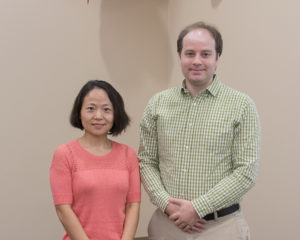SynMatter
Better Corrosion Protection for Consumers and the Environment.
The chemical properties that make current corrosion inhibitors effective usually make them harmful to the environment as well. Consequently, corrosion inhibitors are heavily regulated, and often banned by government authorities. For example, chromates, a class of very effective corrosion inhibitor, have been phased out of use in the EU and severely are limited in the U.S. due to their carcinogenic properties. Strict regulation of corrosion inhibitors has resulted in a significant need for effective and environmentally friendly replacements. Though alternative inhibitors exist, due to their other properties, they can often not be easily incorporated into existing coating protection systems and application methods without hampering the inhibitor’s effectiveness or consuming an unprofitable amount of resources.
SynMatter maintains a competitive advantage over competitor products because the encapsulation of corrosion inhibitors into controlled release microparticles enables incompatible inhibitors to be easily incorporated into coatings. It achieves this by preventing contact between the inhibitor and the coating during coating application. The controlled release particles restrict the inhibitor to only be active during corrosion-triggered events. Further, the encapsulated inhibitors can be incorporated into existing corrosion protection systems without significant changes in coating formulation or application, ideally as drop-in replacements. This also opens up opportunities to use inhibitors in applications where they are currently cannot be used.
SynMatter did, however, face a substantial problem with their market entry strategy. The industry for metal corrosion inhibitors is quite extensive and SynMatter did not know where to begin to get their product into the hands of the right consumers. Through the UCF I-Corps program, SynMatter was able to get a better understanding of the market as a whole and eliminate segments that would not be ideal for market entry. For example, SynMatter eliminated the automotive and aerospace industries from their customer segment groups because of long lead times for getting products specified by equipment manufactures. The I-Corps funding also allowed the SynMatter team to travel to a national corrosion event where they met potential collaborators and clientele.
Great minds with extensive backgrounds had to come together to design the SynMatter corrosion protection solution and bring it to market. Xuejun Zhang, Ph.D., graduate of UCF’s Department of Material Science and Engineering, participated as the team’s Principle Investigator, in collaboration with Entrepreneurial Lead Benjamin Pearman, Ph.D., graduate of UCF’s Department of Chemistry. The team was accompanied by the team’s mentor, Michael Stewart of the Unison Group, with Michael Hampton, Ph.D., Professor in UCF’s Department of Chemistry acting as a supporting team member.



